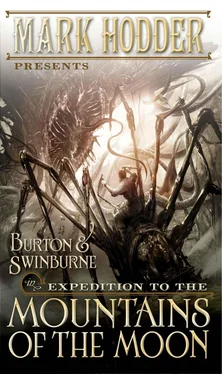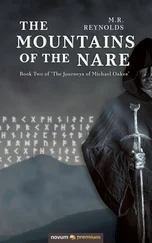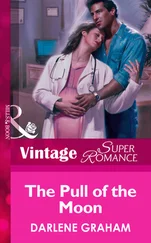Mark Hodder - Expedition to the Mountains of the Moon
Здесь есть возможность читать онлайн «Mark Hodder - Expedition to the Mountains of the Moon» весь текст электронной книги совершенно бесплатно (целиком полную версию без сокращений). В некоторых случаях можно слушать аудио, скачать через торрент в формате fb2 и присутствует краткое содержание. Жанр: sf_stimpank, на английском языке. Описание произведения, (предисловие) а так же отзывы посетителей доступны на портале библиотеки ЛибКат.
- Название:Expedition to the Mountains of the Moon
- Автор:
- Жанр:
- Год:неизвестен
- ISBN:нет данных
- Рейтинг книги:5 / 5. Голосов: 1
-
Избранное:Добавить в избранное
- Отзывы:
-
Ваша оценка:
- 100
- 1
- 2
- 3
- 4
- 5
Expedition to the Mountains of the Moon: краткое содержание, описание и аннотация
Предлагаем к чтению аннотацию, описание, краткое содержание или предисловие (зависит от того, что написал сам автор книги «Expedition to the Mountains of the Moon»). Если вы не нашли необходимую информацию о книге — напишите в комментариях, мы постараемся отыскать её.
Expedition to the Mountains of the Moon — читать онлайн бесплатно полную книгу (весь текст) целиком
Ниже представлен текст книги, разбитый по страницам. Система сохранения места последней прочитанной страницы, позволяет с удобством читать онлайн бесплатно книгу «Expedition to the Mountains of the Moon», без необходимости каждый раз заново искать на чём Вы остановились. Поставьте закладку, и сможете в любой момент перейти на страницу, на которой закончили чтение.
Интервал:
Закладка:
[…]
Cease, Man, to mourn, to weep, to wail; enjoy thy shining hour of sun;
We dance along Death's icy brink, but is the dance less full of fun?
— SIR RICHARD FRANCIS BURTON, THE KASIDAH OF HAJI ABDU EL YEZDICHAPTER 6
“It only requires a scientist to be told what variety of thing to look for, and where best to look, and it is inevitable that the thing will be found. So it was in the earliest days of Eugenics. The hints had been of the vaguest. They were passed from a madman to a drunkard, and from the drunkard to an engineer, and from the engineer to a naturalist, and from the naturalist to Mr. Francis Galton. Whether they seeded themselves in Mr. Galton's brain in anything resembling their original form seems doubtful-we all know how information is corrupted by travel-and yet, in that magnificent, terrifying mind of his, they blossomed, and he dazzled us all with his brilliance. Mr. Charles Darwin, in particular, was enthused to the point where, I regret to say, moral and ethical boundaries ceased to exist for him. To some extent, this happened to all of us in that little band of scientists. Unquestionably, I am now ashamed of certain of my actions whilst under the influence of that great wave of fervour and creativity that overtook us. And I feel somewhat responsible, too, for the dark turn Eugenics very quickly took after it was established as a unique scientific discipline, for it was I who, under Mr. Galton's direction, conjoined his and Mr. Darwin's brains, using techniques that I have since discovered are many, many decades ahead of their proper time. The thing that Darwin/Galton became, as a consequence of that operation, I now regard as a monstrosity, but while it existed I was in its thrall, and much against my better judgement, I was a principal in the horrible path that Eugenics trod. Oh that I could travel back and change everything! The death of Darwin/Galton liberated me and restored my proper senses, but with them I now suffer to witness the villainies of Eugenics; I see the terrifying speed at which its ghastly techniques develop; I see how it has moved so far beyond the original concept of guided evolution that it now perverts life dreadfully. Perhaps it is true that, as many claim, Mr. Darwin killed God. The existence of Eugenics rather suggests to me, I fear, that he did not, at the same time, succeed in destroying the devil.”
— FROM THE EUGENICISTS: THEIR HISTORY AND THEIR CRIMES BY FLORENCE NIGHTINGALE, 1865Edward Oxford thudded onto grass and bounced on his spring-heeled boots. Glancing around, he saw a rolling park surrounded by tall glass buildings whose sides flashed with advertising, and in the near distance, the ancient form of the Monarchy Museum, once known as Buckingham Palace, in which the relics of England's defunct royal families were displayed. A sonic boom echoed as a shuttle headed into orbit. People buzzed overhead in their personal fliers. His AugCom was functioning.
He checked that he was still holding the top hat he'd carried with him, then ran into the wooded corner of the park, not noticing that, in the long grass to his left, a white-haired man was lying unconscious with a sniper rifle, a jewel case, and a portmanteau bag at his side.
Oxford ducked into the trees and pushed through the undergrowth until he felt safe from prying eyes. He detached the Nimtz Generator from his chest and put it on the ground, pulled off his stilted boots and placed them beside it, then stripped off his fish-scale battery suit and draped it over a low branch. Reaching up to his helmet, he hesitated, then switched off the AugCom and removed the headgear. A foul stench assaulted his nostrils, a mix of raw sewage, rotting fish, and burning fossil fuels. He started to cough. The air was thick and gritty. It irritated his eyes and scraped his windpipe. He fell to his knees and clutched at his throat, gasping for oxygen. Then he remembered that he'd prepared for this and fumbled in his jacket pocket, pulling out a small instrument that he quickly applied to the side of his neck. He pressed the switch, it hissed, he felt a slight stinging sensation, and instantly he could breathe again. He put the instrument away and rested for a moment. The inability to catch his breath had been a perceptive disorder rather than a physical one. The helmet had protected him from the idea that the atmosphere was unbreathable; now a sedative was doing the job.
Unfamiliar sounds reached him from the nearby road: horses' hooves, the rumble of wheels, the shouts of hawkers.
He stood and straightened the reproduction mid-Victorian-era clothes that he'd worn beneath his time suit, placed the top hat on his head, and made his way to the edge of the thicket. As he emerged from the trees, a transformed world assailed his senses, and he was immediately shaken by a profound uneasiness.
There were no AugCom illusions now, and only the grass was familiar. Through dense, filthy air, he saw a massive expanse of empty sky. The tall glass towers of his own age were absent, and London clung to the ground. To his left, Buckingham Palace, now partially hidden by a high wall, looked brand new. Quaintly costumed people were walking in the park-no, he reminded himself, not costumed; they always dressed this way! — and their slow pace appeared entirely unnatural.
Despite the background murmur, London slumbered under a blanket of silence.
He started to walk down the slope toward the base of Constitution Hill, struggling to overcome his growing sense of dislocation.
Behind him, unseen, the unconscious man regained his wits, snatched up his things, staggered to his feet, and stumbled into the trees.
“Steady, Edward,” Oxford muttered to himself. “Hang on, hang on. Don't let it overwhelm you. This is neither a dream nor an illusion, so stay focused, get the job done, then get back to your suit!”
He reached the wide path. The queen's carriage would pass this way soon. My God! He was going to see Queen Victoria! He looked around. Every single person was wearing a hat or bonnet. Most of the men were bearded or had moustaches. The women held parasols.
Slow motion. It was all in slow motion.
He examined faces. Which belonged to his ancestor? He'd never seen a photograph of the original Edward Oxford-there were none-but he hoped to recognise some sort of family resemblance.
He stepped over the low wrought-iron fence lining the path, crossed to the other side, turned around to face the hill, and loitered near a tree. People started to gather along the route. He heard a remarkable range of accents and they all sounded ridiculously exaggerated. Some, which he identified as working class, were incomprehensible, while the upper classes spoke with a precision and clarity that sounded wholly artificial. Details kept catching his eye, holding his attention with hypnotic force: the prevalence of litter and dog shit on the grass; the stains and worn patches on people's clothing; rotten teeth and rickets-twisted legs; accentuated mannerisms and lace-edged handkerchiefs; pockmarks and consumptive coughs.
“Focus!” he whispered.
He noticed a man across the way, standing in a relaxed but rather arrogant manner and looking straight at him with a knowing smile on his round face. He had a lean figure and a very large moustache.
Can he see that I don't belong here?
A cheer went up. The queen's carriage had just emerged from the palace gates, its four horses guided by a postilion. Two outriders trotted along ahead of the vehicle; two more behind.
Where was his ancestor? Where was the gunman?
Ahead of him, an individual wearing a top hat, blue frock coat, and white breeches reached under his coat and moved closer to the path. Slowly, the royal carriage approached.
Читать дальшеИнтервал:
Закладка:
Похожие книги на «Expedition to the Mountains of the Moon»
Представляем Вашему вниманию похожие книги на «Expedition to the Mountains of the Moon» списком для выбора. Мы отобрали схожую по названию и смыслу литературу в надежде предоставить читателям больше вариантов отыскать новые, интересные, ещё непрочитанные произведения.
Обсуждение, отзывы о книге «Expedition to the Mountains of the Moon» и просто собственные мнения читателей. Оставьте ваши комментарии, напишите, что Вы думаете о произведении, его смысле или главных героях. Укажите что конкретно понравилось, а что нет, и почему Вы так считаете.












